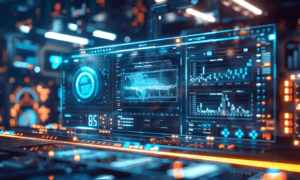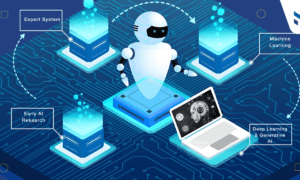Generative AI is making significant strides in Cloud DevOps, reshaping how organizations develop, deploy, and maintain software. As discussed by Karthikeyan Anbalagan, the integration of Generative AI into Cloud DevOps brings automation and intelligent optimization to cloud-based workflows, enhancing the efficiency and quality of software delivery.
Automating Code and Infrastructure Generation
Generative AI introduces a new level of automation in creating code and infrastructure scripts. AI models can now generate code snippets or even complete functions based on natural language input or high-level descriptions. This capability reduces development time and minimizes errors by automating repetitive coding tasks. Additionally, Generative AI is transforming infrastructure management by generating and optimizing infrastructure-as-code (IaC) scripts. The AI-driven process analyzes project requirements and best practices to create efficient, compliant templates, simplifying cloud resource management and deployment across environments.
Intelligent Testing for Robust Software
The integration of Generative AI in testing processes is changing how software quality is ensured. AI-powered tools can automatically generate comprehensive test cases, produce synthetic test data, and predict potential failure points. These capabilities help identify bugs earlier in the development cycle and improve test coverage, resulting in more reliable software and faster release cycles. Intelligent testing not only automates routine tasks but also adapts to evolving requirements, continuously refining test scenarios based on integration results.
Enhancing System Performance with Dynamic Configuration
Generative AI plays a critical role in dynamic configuration and tuning, where systems autonomously adjust configurations in response to real-time traffic and system loads. AI-powered self-optimizing tools analyze performance metrics and usage patterns to scale resources automatically, optimize database queries, and adjust load-balancing rules. This proactive approach ensures that cloud services maintain optimal performance levels and reduces the risk of downtime, enhancing resource efficiency and user experiences.
Reinforcing Security through Automation
Security is a major concern in cloud environments, and Generative AI is helping to automate key security practices. AI tools can automatically generate and update security policies, scan for vulnerabilities in code or configurations, and even generate patches. By leveraging AI for real-time threat detection and response, organizations can improve their security posture, ensuring that cloud infrastructures are consistently protected from emerging threats. The automation of security tasks helps maintain compliance with industry standards while reducing the workload on security teams.
Predictive Monitoring for System Reliability
AI-driven monitoring tools are transforming system reliability management by predicting failures and anomalies before they occur. Through continuous analysis of historical data and real-time system logs, these tools detect unusual patterns and forecast potential issues. Predictive monitoring allows teams to address problems proactively, reducing downtime and maintaining consistent service quality. Intelligent alerting also helps prioritize critical issues, minimizing false positives and optimizing team response efforts.
Facilitating Documentation and Knowledge Sharing
Generative AI extends its capabilities to documentation and knowledge management by automating the creation and updating of technical documents, runbooks, and other resources. AI-generated documentation helps keep information current and accessible, facilitating knowledge sharing across development and operations teams. This automation ensures that important details are maintained without manual effort, promoting better collaboration and operational efficiency.
The Need for Responsible AI Integration
While the benefits of incorporating Generative AI into Cloud DevOps are clear, organizations must consider ethical implications and the need for human oversight. Maintaining transparency, ensuring data privacy, and addressing potential biases in AI outputs are essential for responsible implementation. Establishing ethical guidelines and governance frameworks can help organizations navigate these challenges, ensuring that AI enhances DevOps practices without compromising values or compliance requirements.
Striking the Balance Between Automation and Human Expertise
Integrating Generative AI into Cloud DevOps goes beyond task automation; it enhances human capabilities. By handling routine processes and offering intelligent insights, AI allows DevOps teams to concentrate on strategic and complex problem-solving. As AI continuously learns and evolves, it optimizes cloud operations more effectively, driving innovation and improving software quality.
In conclusion, Karthikeyan Anbalagan’s insights highlight that Generative AI’s role in Cloud DevOps is transforming software development and operations. As organizations embrace this technological shift, they can expect more efficient, secure, and reliable cloud-based solutions, setting the stage for future advancements in the digital era.

































